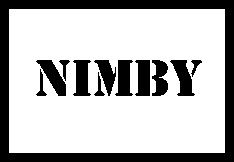The Poetics of Nimby
BLOG POST posted on July 3, 2016 by Joseph Jones
Every word has a poetics. Even a nasty word like nimby.
To get started, forget the content side of the word's poetics. Forget that the Oxford English Dictionary labels the usage as depreciative. Forget that the earliest known recorded usage (November 1980) related to advancement of corporate interests: "The trade" was perturbed that their "secure landfill" for "hazardous chemical wastes" might be impeded by opposition.
Every word is embodied in sound. Every word is a collection of echoes.
Oh. You'd like to take that sound approach and work it through?
First impressions matter very much. Pronounce N all by itself. No, not en. That's the alphabet letter that starts with a vowel. Just do the nasal grunt. There is nimby's first impression.
Now try putting some vowel after the grunt. You'd like to round it off with an o? Get a big No? That's short and negative, but way too meager. You can do better. Stuff on as much back-end vowel as you possibly can. There, that's better.
Nyah.
Congratulations. Whether you knew it or not, you just used a word defined in the Oxford English Dictionary. It even exists as more than one part of speech. As interjection: expressing the speaker's feeling of superiority or contempt for another. And as noun: a taunt; a scornful, sneering attitude.
If one time felt good, try twice.
Nyah nyah.
The dictionary tells you that you didn't invent that one either. A note says: frequently reduplicated. As far as anybody knows yet, this word did not get written down anywhere before 1906. Maybe those fussy Victorians had to die off first?
By now, that opening consonant has been pushed about as far as it wants to go. So, time to move on. Time for a clear vowel that can lead onward and downward.
Since you're feeling self-centered and a bit testy, go for a short i. There you are.
Ni.
Whoa. Careful. You are headed straight toward the notorious N-word. OK. Don't go there.
Even without that, you have latched onto a highly suggestive assonance. So throw a quick wink at some of your short-i companions. To be objective about it all, line them up in alphabetical order: bitch, dick, ditz, hick, mick, nitwit, piss, quim, shit, spic, tit. Could some geeky quant claim that you're propagating covert anti-female sexism? Of course not. Everybody pisses and shits. Right?
For the next consonant, why not go for a cluster? Hmmm. How about mb? Mmmm. Nimb. That's very nimble of you.
By the way, did you know that nimble has become a favorite city planner word? It means being always ready to dance a jig for political masters — not to mention those hidden masters that the political masters front for. Ostensively, a nimble planner fervently avoids defining things like height and FSR. Oops. Sorry to run off-topic like that.
Back to business. Focus on that mb cluster. Listen for the resonances. Do you hear these words harmonizing in the background? Bumble. Crumble. Dumbo. Fumble. Limbo. Stumble.
Nimb …
Too bad that -le ending is already wrecked by too much positive connotation. But take heart. Planner jargon is right in there trying hard to turn that one around. That -le would have been such a natural. Bummer. Now what?
Oh. You have an idea? That reduplication thing did a lot for nyah? OK. Vowel reduplication it is, as close as speakable English can achieve. Go for another shortish i.
Time for a little wonk-out here. The English language has eleven vowels. In technical terms, your word has now colonized the high front territory. Your word also amps it up by shifting from relaxed to tense. OK. End of phonetics lesson.
So there you have it.
Nimby.
Hey. See what you did? You've also come close to a handy well-established word reduplication. Namby-Pamby. But nimby stays just far enough away to stand on its own two vowels. Excellent.
On top of that, a senseless bunch of sounds now looks like a real word. The -y suffix usually means "having the qualities of" or "full of." You wonder why the Oxford English Dictionary had to keep on pontificating and add in that "full of" option? Sorry. This is a considered research effort. No tossing that bit away. So what if being "full of nimb" means nothing.
Now for a little functionality testing. Quick. Word association test. Quick. Quick. Do not think. What is the first sort-of same-sounding word that pops to mind?
Bimbo.
Uh-oh. Not so nice. Definitely anti-female, that one is. Well. At least what came out wasn't Sambo. We already didn't go there.
Ahh. Forget this testing stuff. You've put in a lot of poetic labor. You've got usable product. It could be hazardous to let all this effort go to waste. Just get out there and start calling people nimby. See if your word can fly off and stick to something.
* * * * * *
Appendix:
People are now thoroughly alert to the dangers of hazardous chemical wastes. The very thought of having even a secure landfill anywhere near them is anathema to most Americans today. It's an attitude referred to in the trade as NIMBY — "not in my backyard."
Emilie Travel Livezey. "Hazardous waste." Christian Science Monitor (6 Nov 1980) B5-3
The site for the Vancouver local of The Media Co-op has been archived and will no longer be updated. Please visit the main Media Co-op website to learn more about the organization.
